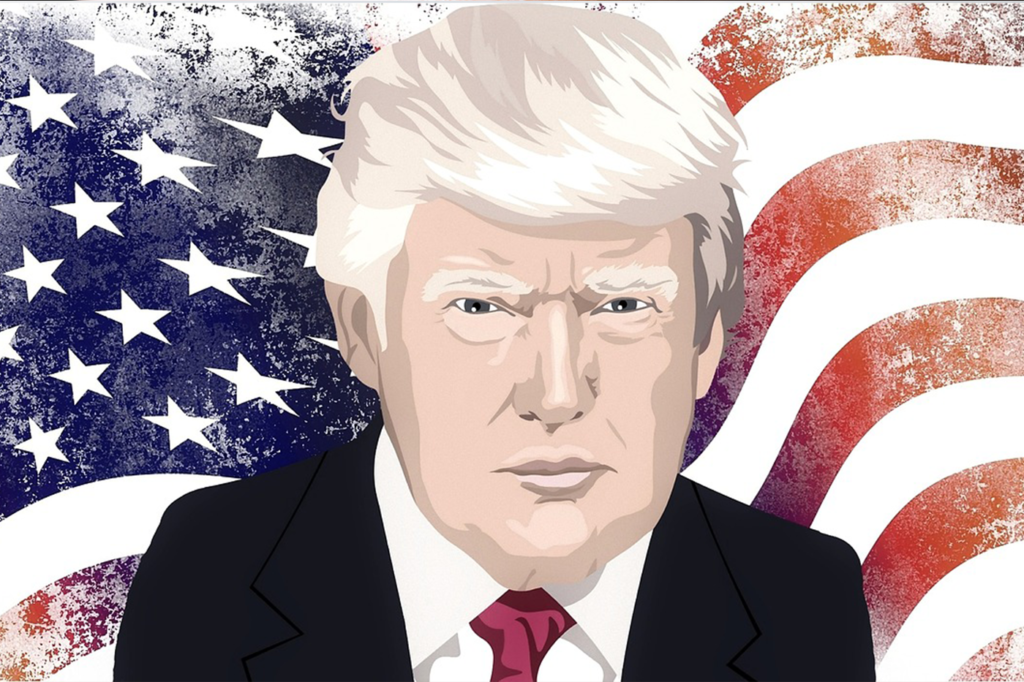Is Donald Trump a hollow man?
Ross Douthat thinks so. He recently opined that “To analyze Trump is to discover only bottomless appetite and need, and to carve at him is like carving at an online troll: The only thing to discover is the void.” This conjures T.S. Eliot’s hollow men, but another of Eliot’s creations may offer a better comparison: “Apeneck Sweeney” also inhabits the spiritual wasteland, for the repression of the soul leaves the inner ape ascendant.
Sweeney is a brutish man with the refrain:
Birth, and copulation, and death
That’s all the facts when you come to brass tacks
Birth, and copulation, and death.Start your day with Public Discourse
Sign up and get our daily essays sent straight to your inbox.
In other words: we are born, we take what pleasure we can, and we die.
There is a resemblance. Trump behaves like Sweeney, unabashed and erect, going for the gusto by indulging his appetites and urges from wrath to lust, including the primal desire to intimidate and humiliate. Douthat is correct to diagnose Trump’s presidency as a symptom of decadence, and may be right that Trump “believes in nothing but his ego, his vanity, his sense of spite and grievance, and the self he sees reflected in the mirror of television, mass media, online.” Trump does not stare into the abyss; he stares at his Twitter feed, news clippings, and television hits.
But, easy as it is to lambaste the temperamental showman in the Oval Office, he is not alone. Our cultural wasteland produces many Sweeneys, as well as many hollow men. Our established political, cultural, and educational elites may hate the president, but he is the apotheosis of what they preach and practice, which is to self-create as self-indulgent consumers and pleasure-seekers. From advertising to academia, desire is glorified.
Of course, the president is often more overt about it than they. He is an enthusiastic hedonist among cautious epicureans. In many of the hollow men of our age, Sweeney is present as a homunculus, self-centered and self-indulgent, but cautious. They are ruled by libertinism, but are also affable and concerned with the morrow. Timidity, not virtue, tempers their appetites—sin carefully!
In his excellent little book, My Father Left Me Ireland, Michael Brendan Dougherty describes the inculcation of such deliberate selfishness; he was taught that “I should do what I loved, and I could love whatever I liked,” and to “keep an open mind, play the options in front of you.” Be guided by desire, especially the desire for comfortable security. Now, he fears that the result of this secular catechesis is that he has “been formed to be sleek, obsequious, and dexterous… to be quick and clever. Not deliberate or wise. To be marketable, not indigestible. I’m taught to get along, not to be intransigent.” And the lessons he describes are standard in our culture. The modern machinery of comfort must be kept running, after all.
The cultural attitude Dougherty describes calls to mind Nietzsche’s last man, who makes everything small, even the enjoyments he cautiously partakes of; “One has one’s little pleasure for the day and one’s little pleasure for the night: but one honors health.” And one honors one’s career and connections, which is why so many big Sweeneys, from Weinstein to Epstein, got away with it for so long. Be agreeable and protect yourself—such teachings do not make men who will speak unpopular truths, or inspire heroes who will risk themselves in opposition to evil. From LA to DC to NYC, the stench of cultural decay is persistent, vividly illustrated not only by the abuses committed by the powerful, but by the many more who knew of them, and did nothing.
These hollow men, whose desiccated spiritual husks contain diminutive Sweeneys, are aptly named, for they are “Shape without form, shade without color/Paralyzed force, gesture without motion,” not “lost violent souls, but only . . . the hollow men.” Their vice, Russell Kirk observed, “is flaccidity of will.” They enable the predations of those who are less timid and more in touch with their inner ape, for the hollow men exercise self-control only out of caution, not virtue, and therefore cannot restrain the violent passions of the wholehearted Sweeneys.
For all the moral outrage directed at Trump, there is little effort to cultivate an alternative of real generosity, compassion, and self-control. The hollow men of late modernity have moral fads, but no enduring moral vision. Their moral impulses are fragmentary and often contradictory, rooted as they are in desire and fashion, rather than true knowledge of human flourishing and excellence. Thus, they constantly find themselves stampeded into new moral views, unsure whether today’s ethical fashions will be damned the day after tomorrow, or even whether today’s jokes will soon be deemed problematic.
A multitude of hollow and Sweeney-like philosophies proliferate in this moral vacuum, worshipping appetites and methods of satisfying them. There are sexual Sweeney-isms, encouraging us to indulge and identify with whatever turns us on. There are respectable free-market Sweeneys, with charts and graphs and data on how increases in production and efficiency allow us to better indulge ourselves. And there are a legion of spiritual Sweeneys. There are odd instances of pagan recrudescence and a buffet of spiritual-but-not-religious pablum. Worse still are the multitude of supposedly Christian teachers whose heresies all sanctify what the Bible forthrightly described as sins, especially greed and lust. It has aptly been noted that much progressive Christian teaching is the prosperity gospel repurposed for sexual license.
In the wasteland, forthright self-assertions of desire may appear substantial next to the selfishly cautious. Nonetheless, there is a hollowness to them. To be full of oneself is to be devoid of anything else, to be hungry is to be empty, and primitive pleasure provides less reason to live than it initially seems. Speaking to the BBC in 1956, Eliot anticipated the fate of the emerging civilization that was neither pagan, nor communist, nor Christian, stating “I think that the end of a purely materialistic civilization with all its technical achievements and its mass amusement is . . . simply boredom. A people without religion will in the end find that it has nothing to live for.”
He was right. Despite unprecedented wealth, knowledge, entertainment options, and technology that increasingly allows us to reside within curated personal realities, our culture creates little of enduring worth and is suffused with boredom and loneliness. In particular, those left behind economically are stupefied with cheap entertainment, porn, and chemicals. Opioids are now the opium of the masses; Netflix and chill is more likely Netflix and pill.
Symptoms of decadence are pervasive, especially the self-imposed sterility of Western citizens, who are having children well below the replacement rate. Excuses are offered (environmental concerns, debt, the cost of raising children), but the truth is that our culture is ambivalent about whether life is worth passing on.
This is the predictable end of the inhabitants of a spiritual wasteland, populated by Sweeneys, hollow men, and the fussy priests of the odd cults and movements that flourish as genuine faith recedes (such as the gentrified socialism that cares more about student loans and gender identities than actual laborers). There are reasons to care which denizens of the wasteland hold political authority, but rejuvenating the wasteland is the more important task. Without recognizing the decadence of our culture, denouncing (or defending) the latest tweet from the president is just a desultory wind swirling dust and ashes.
Thus, Eliot’s poetry and prose remain essential reading. His early work offers a glimpse of Hell, or at least Hell on earth. After his conversion to Christianity, he completed his task as a Dante for our age, with the purgatorial Ash Wednesday and the promise of heaven found in his Four Quartets. The faint glimmers of hope amid the despair of The Waste Land and The Hollow Men were transformed into scintillating radiance by the end of Little Gidding, and Eliot himself was an example of how a great poet and intellectual could accept Christian orthodoxy.
As poet, critic, and Christian, Eliot showed the way beyond the wasteland, but we have not left it behind, for the quest to revive the dead land must be undertaken again and again with the generations. There are no permanent victories,
There is only the fight to recover what has been lost
And found and lost again and again: and now, under conditions
That seem unpropitious. But perhaps neither gain nor loss.
For us there is only the trying. The rest is not our business.
There is no golden age to return to or to usher in; improvements in one area may correspond to declines elsewhere.
Eliot does not tempt us to indifference, but to an “expanding of love beyond desire” that reveals that our action is often of “little importance.” Politicians and princes cannot save us. Spiritual renewal, and only spiritual renewal, can regenerate the wasteland. Our primary task in this redemption is personal—to repent of our own hollowness, or our own likeness to Sweeney. Writers should still write, pundits should still opine, but even more we must repent.
But that is hard; obsessing over the latest wicked words of politicians is easy. May the judgment not be too heavy upon us for believing that this is the way the world ends—not with a bang but a twitter.














